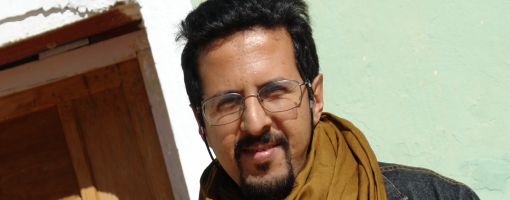
A visiting journalist from Western Sahara today appealed for support from New Zealand to block trade supporting the military occupation of his country by Morocco. Pacific Media Centre, New Zealand, 23 July 2007.
Pacific Media Centre
23 July 2007
By Joseph Barratt
“Our rights, our liberty are at stake - if we lose them now, you will lose them tomorrow”, said Malainin Lakhal, who arrived in Auckland at the weekend after several weeks visiting Australia.
He is in New Zealand to raise awareness for a conflict that he says misses out on “headlines” because it is not as bloody as those in Iraq and other countries.
His people are the Saharawi from Western Sahara, previously a colony of Spain. After winning the right for self determination in 1975, Morocco promptly invaded and occupied the territory with 120,000 soldiers.
Western Sahara is rich in phosphates which is a key ingredient in most fertilisers. New Zealand imported more than $160 million worth of fertilisers and phosphates from Morocco in 2006 alone.
The exploitation of resources from non-self-governing territories was breaching international law, said Lakhal.
On January 29, 2002, Hans Corell, legal council for the United Nations issued a legal opinion saying that if Western Saharas phosphate was exploited with disregard to the interests and wishes of the people of that country then it would be in breach of international law.
Speaking at the Pacific Media Centre, Lakhal said he had contacted the New Zealand government and he had been told that while exploiting the resources was illegal, importing them was not.
He said the NZ money was in turn used by the military and strengthened the wall that cuts Western Sahara into two - about two-thirds of the country is military occupied.
Lakhal, secretary-general of Saharawi Union of Journalists and Writers (UPES), described it as the longest military wall in history - 2700 km.
"Every 2-3km there is an army base," Also, the length of the wall had been heavily mined.
Born in Moroccan-controlled Western Sahara and educated in Moroccan schools, Lakhal saw the discrimination first hand.
“We are occupied people. We know that and we can feel that,” he said.
“Since 2005 there has been a popular uprising, but the media does not know anything about this. There is a complete media blackout.”
“No organisations or media are allowed into the occupied territories.”
Today there are more than 160,000 refugees from Western Sahara living in camps on the Algerian border, waiting to return to their homeland.
Resistance has been strong since the invasion but after a UN organised ceasefire in 1992 there has not been armed conflict.
More than 80 nations recognised Western Sahara as a state in its own right, as did the Untied Nations and the African Union, yet Morocco refused to concede this and had the backing of the United States, said Lakhal.
Morocco is the only African state not a member of the African Union. It withdrew from the Union after other member states supported Western Sahara's right to self determination.
Morocco is also one the few remaining constitutional monarchies in the world.
“We cannot accept occupation just because Morocco is stronger then us", said Lakhal. "Write letters to your government and to your MPs”.
Order our Western Sahara poster!
“Try to Visit Western Sahara”…
The Security Council fails Western Sahara and international law
On 31 October 2025, a new resolution was adopted in the UN Security Council calling on the Saharawis to negotiate a solution that would entail their incorporation into the occupying power, Morocco.
Saharawis Demonstrate Against Trump Proposal
The United States has proposed in a meeting of the UN Security Council on Thursday that the occupied Western Sahara be incorporated into Morocco.
Skretting Turkey misled about sustainability
Dutch-Norwegian fish feed giant admits using conflict fishmeal from occupied Western Sahara. Last month, it removed a fake sustainability claim from its website.



